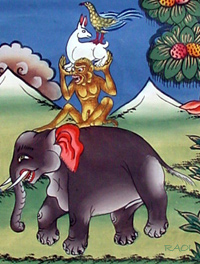| You are here: | Home > Bhutan > Information > Topics > Religion > Thanka > Thanka | Search |
 |
| Bhutan's Religion |
| Four Harmonious Brothers - Four Faithfull Friends |
|
 |
|
|
| Brief History of Thanka |
Thanka = Thangka (religious scroll paintings)
Thanka painting is one of the major science out the five major and five minor fields of knowledge. It's origin can be traced all the way back to the time of Lord Buddha. The main themes of Thanka paintings are religious. During the reign of Dharma King Trisong, Duetsen the Tibetan masters refined there already well developed arts through research and studies of different country's tradition.
Thanka
painting's lining and measurement, costumes, implementations and ornaments
are all based on Indian style. The drawing of figures are based on Nepalese
style and the background sceneries are based on Chinese style. Thus, the
Thanka paintings became a unique and distinctive art.
| Four Harmonious Brothers |
Once upon a time an elephant came upon a giant tree in the forest by the river bank. He rested under its shade for a rest. Soon a monkey came to rest there also.
The elephant said, "This is my tree. I found it first."
The monkey replied, "Do you see any fruit on this tree?"
"No" said the elephant.
The monkey said triumphantly, "Ah! I was here before you. I ate up the fruits on this tree before you got here."
The elephant then bowed to the monkey,
"OK, you're my big brother, since you came here first."
"Wait a minute" said the rabbit that hopped by, "When I saw this tree, it was just a sapling with only a few branches and certainly not any fruit. So I was here before both of you."
Then the elephant and monkey bowed to the rabbit: "OK, you're our big brother, since you were here first."
Just then, they heard "Ha! Ha! Ha!" from a partridge on the treetop: "This tree wouldn't have sprouted if I didn't spit out the seed from a fruit I had eaten. So I was here before all of you."
Then the elephant, monkey, and rabbit, all bowed to the partridge, "OK, you're truly our big brother, since you planted this very tree."
Then they decided to share the tree together in peaceful harmony - enjoying the beauty of the tree's fragrance, the nourishment of the tree's fruits, and the bounty of the tree's shade.
Other animals in the forest often see them together with the partridge on top of the rabbit who is held up by the monkey who rides on top of the elephant.
Henceforth, they were called "the four harmonious brothers", and by their example, peace reigned throughout the jungle.
In one of the Buddha's previous lifetimes, in the forest of Kashika, there lived four noble beings - a bird, a monkey, a rabbit, and an elephant. The four, who drank at the same spring, soon became friends. One day they decided that it would be proper to show the greatest respect for the eldest among them. To determine their respective ages, each one recalled the height of a nearby nyagrota tree when he had first seen it.
 |
|
The four then showed each other respect accordingly.
The elephant placed the bird on the crown of his head, the rabbit on his neck, and the monkey on his back.
Then the bird said, "Now we must keep the five basic disciplines throughout our lives."
This
they did, and to insure that all other beings did the same, the bird initiated
all those with wings, the elephant initiated all those with fangs, the
rabbit initiated all those with paws, and the monkey initiated all those
with fur. Even today, these animals are depicted in Buddhist art as a portrait
of harmony, especially in buddhist monastery wallpaintings.
| People's belief in Bhutan |
 |
Partridge | The partridge is sowing. |
 |
Rabbit | The rabbit is fertilizing. |
 |
Monkey | The monkey is watering. |
 |
Elephant | The elephant is watching. |
|
|
|
|
|
|